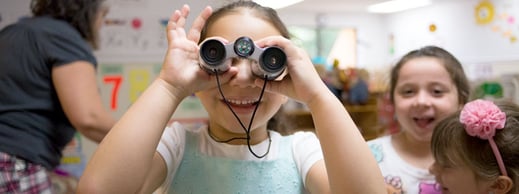
I have been a CLASS observer and trainer for several years now and I’ve been thinking about the concept of “drift.” Drift happens to people who have passed the reliability test, but over time they start scoring subjectively—they let their biases affect the data.
I have trained numerous observers over the last three years, and I have noticed that sometimes we forget to use our CLASS lens when we are observing people that we know. It’s hard to give someone we know a low score—even if the interactions you observed are objectively in the low range. I had one observer who once gave the scores to the teacher and the teacher looked at her and said, “I thought that we were friends.” Being friends should never affect this process.
During my first year as a CLASS observer (before I became a trainer) I went in with my co-worker to observe a classroom at the same time. When we had finished our 20-minute observation we walked out and sat down to score. We started to score together and to talk about our results, but that was a mistake. In reality, what we should have done was score first and then compare. My co-worker was more willing to spin a positive light on the observation, whereas I wanted to score what I had observed even if it meant assigning a low score. Even though we had both been in the same training and passed the same test, we didn’t score the same way.
Another time, I had an observer that struggled to pass the reliability test, but after a few attempts she finally did. I sent her out to the sites to do some observations, but was concerened to see she was scoring the negative range in the middle range. I did not have her notes, so I could not reference what she saw. When I talked to her about the specific observation she couldn’t give me details as to why she had scored in the middle range for the negative. I didn’t want to give the teacher those scores if they weren’t correct, so I decided to go back into the classroom and do another observation. I found that the other observer’s scores did not match mine. This should not happen when we are all trained the same and all have the same materials available to us.
I did get some validation on my scoring this past year. I had done a CLASS observation on a classroom that was part of a pre-K program, and about two months after I had completed my observation we had the Department of Education from the state come in and do an observation. We looked at both scores and if not identical, we were within one point of each other. The more I do these observations the more I understand the “CLASS lens.” It is important of all of us to use this lens and leave our biases out when we are observing.
To keep my observers reliable, I try not put observers with people that they supervise or with their friends. I also hold training sessions throughout the year just before my observers go into the classroom to do their observations. That way, the “CLASS lens” will be fresh in their minds and they will be more likely to score accurately.
 Anita Robinson has nine years of experience working with Head Start and Early Head Start programs. She started her Head Start career in Florida and has since moved back to her home state of Maine. Anita currently works for Community Concepts, Inc in the Children Services Department as a Program Manager. She oversees five sites ranging from Early Head through Pre-K. She has been a certified CLASS observer for five years and a CLASS trainer for three years. Anita says that doing CLASS observations has come naturally for her since she has always been a people-watcher. She is passionate about using CLASS to help teachers become the best that they can be so that children get the best education.
Anita Robinson has nine years of experience working with Head Start and Early Head Start programs. She started her Head Start career in Florida and has since moved back to her home state of Maine. Anita currently works for Community Concepts, Inc in the Children Services Department as a Program Manager. She oversees five sites ranging from Early Head through Pre-K. She has been a certified CLASS observer for five years and a CLASS trainer for three years. Anita says that doing CLASS observations has come naturally for her since she has always been a people-watcher. She is passionate about using CLASS to help teachers become the best that they can be so that children get the best education.

